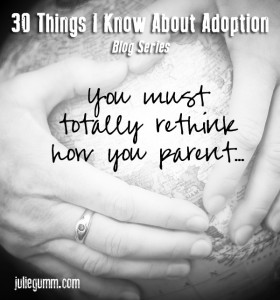 Part of the November series “30 Things I Know About Adoption.”
Part of the November series “30 Things I Know About Adoption.”
Guest post by Philip Rhodes (my big brother)
The other day, on vacation, we visited a Catholic church with a family member. We’re not Catholic, but we visited this church a year ago as well. During the drive, our oldest told us she was scared of the large crucifix in the church. (We don’t remember this fear at all from last year.) We tried to reassure her, promising to sit near the back of the church. But, as we drove in the parking lot, she became hysterical at the prospect of going inside. So, I sat outside in the car with her while the rest of the family went to church. Even when my wife texted they were in the side alcove and couldn’t see the crucifix, I couldn’t persuade her to go inside the church.
When you adopt, two issues in your child’s life loom larger than any ordinary parenting issue. First, your child suffers trauma from losing their biological mother, even if you adopt at birth. Depending upon your child’s life circumstances, your child may suffer additional losses. According to experts, this loss is “more profound” and “more pervasive” than almost any other loss.
Second, you must ensure that your child attaches to her new mother. In a typical biological parent-child relationship, this happens naturally as mom cares for the child. When you adopt your child, you teach them, at whatever age you adopt, that just like mom and newborn, you will provide all their needs. You also have to build their trust that they won’t suffer yet another rejection. Your child’s previous trauma may prove a significant barrier to building this trust.
The “adoption-loss” issue, and the sense of foundational rejection that comes with it, never really goes away. At every major development stage, your child will have to process this issue again. As adoptive parents, you help them come to terms with what adoption means to them. There are an awful lot of adult adoptees still very angry they were adopted. Your child doesn’t have to join their ranks.
To raise our three adopted kids as well as we can, my wife and I evaluate every major parenting issue through the lens of adoption. When we confront a behavioral issue, we ask ourselves whether it’s adoption-related at all. Sometimes this takes deep analysis, and sometimes we’re still blind to the adoption issue staring us in the face.
Was my daughter’s fear a simple childhood fear, or an adoption issue? My wife and I talked it through, and recognized a pattern with other fears. We certainly understood the fear itself. But, we think Julia’s hysterical reaction demonstrated an absence of trust and a felt need on her part to control the situation. As adoptive parents, we need to err on the side of treating it as an adoption issue. And this came from our oldest, who’s been in our family for four years already.
As adoptive parents, the adoption issues in our kids constantly evolve. But, they don’t disappear. Helping our child address these issues is our most important priority.


